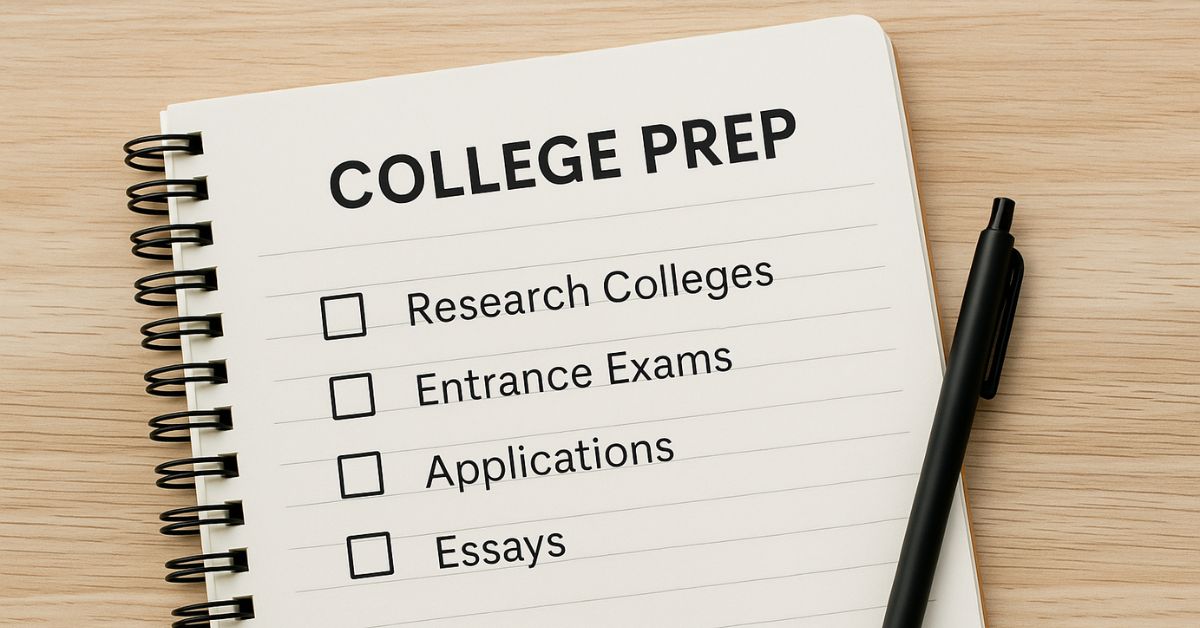When it comes to planning for college, homeschool families face unique opportunities and challenges. Many parents worry whether their child’s homeschool experience will be seen as legitimate by colleges, or if their child will be academically—and socially—ready to handle the new demands. The good news is that with thoughtful preparation, intentional academic and personal development, and a focus on practical steps, homeschoolers can not only transition easily to college, but thrive once they get there.
This guide focuses on the primary keyword, college prep for homeschoolers, and provides practical, actionable advice for parents and students. We’ll discuss academic preparation, navigating the application process, extracurricular and community activities, and building critical life skills for higher education.
Whether your child is in middle school, high school, or just beginning to think about college, these tips will help set a strong foundation.
Academic Preparation For College Success
Building a strong academic base is one of the most important aspects of preparing your homeschooler for college. Colleges and universities want to know that incoming students can handle rigorous coursework, manage deadlines, and think critically. Here are some detailed steps to guide your family through the academic elements of college prep.
- Develop a Comprehensive Transcript
Colleges rely heavily on transcripts to evaluate homeschool applicants. It’s vital to create a well-structured, professional-looking homeschool transcript. This should clearly list all subjects studied, the grades earned, the number of credits, and the years each course was completed. Include all standard core subjects such as mathematics, science, English, and social studies, as well as electives or specialized studies like computer science, foreign language, music, or art. If your homeschooler has taken any AP or honors courses, dual-enrollment classes at a community college, or participated in distance learning, list these prominently.
Ensure your transcript has an official look—there are many online transcript generators designed specifically for homeschoolers, or you can use a template and personalize it. Include an explanation of your grading scale and course descriptions if possible. Attach standardized test scores and a homeschool profile outlining your educational approach; this helps admissions officers understand your homeschool program in context.
- Emphasize Rigorous Coursework
Homeschooling allows for flexibility, but it’s important not to cut corners on academic rigor. Match the coursework level to your child’s ambitions. College-bound homeschoolers should undertake a challenging load, possibly including advanced science labs, higher mathematics, and writing-intensive courses. Consider collaborating with online learning platforms, local tutors, or homeschool co-ops for subjects that may be difficult to teach on your own.
- Pursue Dual Enrollment Opportunities
Enrolling in community college or university courses while still in high school demonstrates that a homeschooler can handle college-level work. Dual enrollment enables students to earn both high school and college credits simultaneously, experience a traditional classroom environment, and interact with diverse peers. Many colleges view dual enrollment as a sign of motivation and initiative. Check your local regulations for dual enrollment opportunities and ensure your child is prepared for the increased accountability such classes require.
- Aim for Academic Excellence
Grades still matter, even in a homeschool environment. Set clear academic standards and strive to maintain a competitive GPA. Periodically review progress, offer feedback, and adjust teaching methods where necessary to fill gaps or address difficulties. If you need external verification, consider enrolling in online accredited programs or using tutors who provide grades and evaluations.
- Cultivate Essential Study Skills and Time Management
Beyond grades and coursework, one of the best ways to set your child up for college success is by teaching good study habits. Assigning research projects with multiple deadlines, balancing several subjects at once, and introducing a planner or digital calendar can foster time management and organization. Discuss strategies for handling large assignments, encourage asking for help when needed, and promote independent problem-solving.
Academic preparation is not just about checking boxes; it’s about helping your child grow into a confident, resourceful learner. Invest time early and make adjustments that best support your homeschooler as they work toward higher education.

Navigating College Entrance Exams And Applications
The path from homeschool to college often winds through a landscape of standardized testing and detailed application packets. While this process can be a bit more complex for homeschoolers than for their traditionally schooled peers, many colleges are familiar with homeschool backgrounds and have admissions policies specifically designed to accommodate them.
- Research Testing Requirements Early
Different colleges maintain different testing expectations, so begin researching prospective schools during your child’s freshman or sophomore year. Some schools have shifted to test-optional policies, but many still accept or prefer SAT or ACT scores from homeschoolers as an objective measure of competency. If your child is applying to competitive programs, consider also whether they should take AP exams or SAT subject tests to further bolster their application.
Once you know which tests are required, set up a study schedule. Use free online resources, test prep books, or even formal exam prep courses to help your child prepare. Take official practice exams to get familiar with the format and timing. Schedule the exams with enough time for retakes if necessary.
- Gather Meaningful Letters of Recommendation
One challenge homeschool parents face is finding adults besides themselves to write letters of recommendation. Most colleges prefer at least one recommendation from a non-parent. Consider reaching out to co-op teachers, online instructors, tutors, coaches, community service coordinators, clergy, or volunteer supervisors. Build these relationships over time so recommenders can write genuinely about your child’s strengths.
Explain the purpose of the recommendation and offer a summary of your child’s key achievements, work ethic, and contributions to make it easier for the recommender.
- Guide the Essay Writing Process
College application essays are the perfect opportunity for homeschoolers to tell their unique story and shine a light on their educational journey. Work with your child to brainstorm essay topics that showcase their strengths, values, and experiences. Encourage authenticity and self-reflection—admissions officers appreciate genuine voices over overly polished, “perfect” responses.
Have your child create outlines, draft essays, and edit multiple times. Seek feedback from family, friends, or a writing tutor, but ensure the final work is your child’s own. Focus on clarity, storytelling, and connection to the student’s overall application narrative.
- Master the College Application Process
Most applications are now completed online, but they can still seem daunting. The Common Application is accepted by hundreds of schools, but each may have unique questions for homeschoolers, such as a homeschool recommendation (sometimes called a ‘School Counselor Report’) or detailed explanations of curriculum and grading. Be thorough and transparent—include an educational philosophy, course descriptions, and extracurricular lists.
When listing activities, don’t overlook achievements outside of academics, such as part-time jobs, family responsibilities, internships, or unique homeschool experiences. Double-check every field for accuracy before submitting.
Adapting to the college admissions process as a homeschooler requires a proactive attitude, clear documentation, and a willingness to advocate for your child’s accomplishments.
Extracurricular Activities And Community Engagement
While grades and test scores are important, many colleges also seek students who are engaged, curious, and committed to making a difference outside the classroom. Homeschoolers can have rich, diverse experiences that set them apart—if they deliberately seek and document them.
Find and Commit to Meaningful Activities
Encourage your child to get involved in community organizations, faith-based groups, sports leagues, music ensembles, or art classes. Participation in clubs like 4-H, Scouts, robotics, debate, or other local groups can lead to valuable skills and leadership opportunities. If your area lacks such options, consider starting a group or volunteering for a cause you care about.
Serve the Community
Ongoing volunteer service is highly regarded by colleges and helps build empathy and leadership. Volunteering also allows your child to network, develop references for applications, and expand their worldview. Document all service hours, projects, and your child’s specific contributions—these details matter on college applications.
Pursue and Demonstrate Leadership
Leadership doesn’t always mean being president of a club; it can also mean starting a new initiative, organizing a fundraiser, teaching a class, or mentoring younger students. Seek out ways for your homeschooler to lead and record these experiences and outcomes.
Participate in Athletics and the Arts
Performing arts and sports demonstrate dedication, discipline, and teamwork. Participation in private music lessons, art competitions, or local sports teams helps round out your child’s application and shows a commitment to personal development outside academics. Even hobbies like coding, crafting, or writing can be developed into noteworthy experiences.
Above all, encourage your child to commit deeply to the activities they truly care about. Colleges notice students who pursue interests over years, take on increasing responsibility, and show growth in their engagement and character.
Fostering Critical Skills For Independence
Transitioning from the cozy, tailored environment of homeschooling to the broad, self-directed world of college can be one of the toughest parts of the experience. Academic preparation is vital, but so is helping your child gain independence and confidence in daily life, relationships, and self-advocacy.
The best time to start is now—no matter your child’s age or stage of learning. Encourage them to handle increasing responsibility for their own schedule, work, and personal affairs as they get older. Start by letting your child choose and manage some of their assignments. Discuss the importance of deadlines and allow them to experience both the positive and negative consequences of meeting or missing them.
Teach financial literacy—this includes creating and sticking to a budget, opening and managing a bank account, understanding the basics of credit, and making responsible purchasing decisions. Real-life practice, like planning a grocery trip or managing a weekly allowance, builds a foundation for managing more significant expenses in college.
Communication skills are also critical. Teach your child how to compose professional emails, approach adults with questions, participate in interviews, and advocate for their needs. College professors and advisors expect students to reach out if they need help—empower your child to do so with confidence.
Developing resilience is another key. Help your child accept setbacks as part of learning, and talk through challenges openly. Encourage them to seek solutions independently, and praise persistence. The ability to recover from academic, social, or personal hurdles is essential for college and for life.
Support your homeschooler in building solid study habits by helping them find a system that works for their learning style. Whether using planners, digital calendars, or study groups, foster routines that keep your child organized and prepared.
Organizing College Research And Making Decisions
As your homeschooler nears the end of high school, it’s time to turn your attention to researching and choosing the right colleges. This process can feel overwhelming, but by breaking it into steps, your family can make wise, thoughtful decisions that set your child up for a positive college experience.
Start by creating a list of potential schools. Encourage your child to think deeply about what they want from college—large or small campus, close to home or further away, urban or rural, secular or faith-based, liberal arts or specialized. Make a spreadsheet to track each school’s location, size, available majors, clubs, and campus culture.
Next, schedule in-person campus visits if possible, or virtual tours if travel is difficult. Walk around campus, sit in on a class, and talk to current students to get a feel for everyday life. Ask questions about housing, social events, and academic support services. Afterward, discuss your impressions as a family and continue to refine your target list of colleges.
Consider the financial side carefully. Compare tuition, room and board, books, and travel expenses for each school. Factor in available merit scholarships, need-based grants, and aid programs—don’t overlook scholarships designed specifically for homeschoolers. Set up a family meeting to discuss what your household can contribute and encourage your child to research and apply for scholarships independently as well.
Research the academic offerings in your child’s areas of interest. Explore faculty backgrounds, department reputations, and the range of classes available for each major. Investigate internship or research opportunities, study abroad programs, and student organizations affiliated with their intended field. Finally, help your child meet all application and financial aid deadlines by creating a calendar of due dates. Use checklists and reminders to ensure nothing slips through the cracks. Together, review each application before submission and celebrate milestones as you complete each requirement.
Strong college prep for homeschoolers is an investment in your child’s academic achievement, personal growth, and lifelong confidence. Your hands-on involvement, creative planning, and commitment to practical skill-building pave the way for your homeschooler to cross the bridge to higher education fully equipped to succeed. With each step—academics, testing, activities, independence, and college research—you help lay the foundation for your child’s bright, self-directed future.





